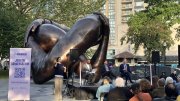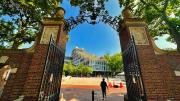On November 12, two days before poet Tom Paulin was scheduled to deliver the annual Morris Gray Lecture, sponsored by the department of English and American language and literature, his reading was canceled "by mutual consent." So read a statement posted on the department's website by its chairman, Cabot professor of English Lawrence Buell. The terse announcement expressed sincere regret about the "widespread consternation that has arisen as a result of this invitation, which had been originally decided on last winter solely on the basis of Mr. Paulin's...accomplishments as a poet."
The "consternation" arosewithin the department and from external sources, such as an article titled "Welcome Voice? Harvard invites academic who wants Jews 'shot dead,'" posted on the National Review Online website November 12due to Paulin's harsh published comments about Israeli troops and settlers in contested territories. Thus issues of free speech contended with the boundaries of hate speechso the lecture committee members, who had sought to arrange a poetry reading, suddenly confronted something different and much more divisive. They reportedly weighed the likelihood of protest beyond what might be accommodated in a discussion separate from Paulin's presentation itself, and then acted. Editorials in the Crimson and the Boston Globe supported the decision to cancel the appearance.
Then others weighed the issue differently. In a November 15 letter to the Crimson, law professors Alan M. Dershowitz, Charles Fried, and Laurence H. Tribe described Paulin as "By all accounts...a despicable example of the anti-Semitic and/or anti-Israel posturing" current in some circles; regretted the initial invitation; but called the cancellation "truly dangerous" and pointed to Harvard's ability to engage speakers who have included "cranks, monsters, scoundrels, and charlatans." The English department met on November 19 and reinstated the invitation. Buell's statement on the new decision said, in part, "All faculty members present, constituting nearly the entire department, approved this decision," noting that the action was "initiated and pursued by the English department alone." The decision was motivated by "belief in the importance of free speech as a principle and practice in the academy," and members of the department "in no sense endorse the extreme statements by Mr. Paulin that have occasioned concern in the Harvard community...." The statement concluded by noting that if Paulin appears on campus, tentatively this spring, "we hope that his delivery of the Morris Gray Lecture may serve as a learning occasion for us all."





